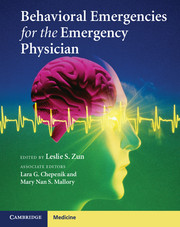Book contents
- Behavioral Emergencies for the Emergency Physician
- Behavioral Emergencies for the Emergency Physician
- Copyright page
- Contents
- Contributors
- Preface
- Section 1. General considerations for psychiatric care in the emergency department
- Section 2. Evaluation of the psychiatric patient
- Section 3. Psychiatric illnesses
- Section 4. Treatment of the psychiatric patient
- Section 5. Special populations
- Section 6. Administration of psychiatric care
- Chapter 38 Coordination of emergency department psychiatric care with psychiatry
- Chapter 39 Integration with community resources
- Chapter 40 The role of telepsychiatry
- Chapter 41 Emergency medical services psychiatric issues
- Chapter 42 Triage of psychiatric patients in the emergency department
- Chapter 43 The Emergency Medical Treatment and Active Labor Act (EMTALA) and psychiatric patients in the emergency department
- Chapter 44 Assessing capacity, involuntary assessment, and leaving against medical advice
- Chapter 45 Best practices for the evaluation and treatment of patients with mental and substance use illness in the emergency department
- Chapter 46 Improving emergency department process and flow
- Chapter 47 Physical plant for emergency psychiatric care
- Chapter 48 Legal issues in the care of psychiatric patients
- Chapter 49 Law enforcement and emergency psychiatry
- Chapter 50 Research in emergency psychiatry
- Chapter 51 Administration
- Index
Chapter 43 - The Emergency Medical Treatment and Active Labor Act (EMTALA) and psychiatric patients in the emergency department
from Section 6. - Administration of psychiatric care
Published online by Cambridge University Press: 05 April 2013
- Behavioral Emergencies for the Emergency Physician
- Behavioral Emergencies for the Emergency Physician
- Copyright page
- Contents
- Contributors
- Preface
- Section 1. General considerations for psychiatric care in the emergency department
- Section 2. Evaluation of the psychiatric patient
- Section 3. Psychiatric illnesses
- Section 4. Treatment of the psychiatric patient
- Section 5. Special populations
- Section 6. Administration of psychiatric care
- Chapter 38 Coordination of emergency department psychiatric care with psychiatry
- Chapter 39 Integration with community resources
- Chapter 40 The role of telepsychiatry
- Chapter 41 Emergency medical services psychiatric issues
- Chapter 42 Triage of psychiatric patients in the emergency department
- Chapter 43 The Emergency Medical Treatment and Active Labor Act (EMTALA) and psychiatric patients in the emergency department
- Chapter 44 Assessing capacity, involuntary assessment, and leaving against medical advice
- Chapter 45 Best practices for the evaluation and treatment of patients with mental and substance use illness in the emergency department
- Chapter 46 Improving emergency department process and flow
- Chapter 47 Physical plant for emergency psychiatric care
- Chapter 48 Legal issues in the care of psychiatric patients
- Chapter 49 Law enforcement and emergency psychiatry
- Chapter 50 Research in emergency psychiatry
- Chapter 51 Administration
- Index
Summary
Keywords
- Type
- Chapter
- Information
- Behavioral Emergencies for the Emergency Physician , pp. 320 - 323Publisher: Cambridge University PressPrint publication year: 2013
- 1
- Cited by



